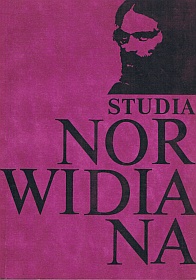Norwid on the National Predicament
Abstract
Norwid’s West-European and American experiences enabled him to gain some cognitive distance to Polish problems, but they also provided him with knowledge of the civic culture of societies that were free and, as compared with Poland, democratic. Just as in criticizing Polish vices Norwid set Polish society against Western ones, so it was also in European experiences that he found his inspirations for a program o f civic revival o f Poland. Thus, he preached democratically conceived rights o f men, praised the parliamentary system, stressed the significance o f public opinion and the value o f pluralism and tolerance, saw the need for a free press and general education and advocated modern political culture. What is characteristic o f Norwid ’s program is the fact that he did not want to defer its realization until some future happy days, when a free Poland is established and starts organizing itself. On the contrary, he adressed his p o stulates to his contemporar ie s, since in the public institutions he wanted to introduce in Poland he saw a means o f counteracting the debasement o f the community in bondage. Openness, public opinion and an independent press were to force out the bondage o f Polish minds and to enlarge the scope o f freedom. This was to be done by “small steps” , by taking advantage o f all breaks in the system o f oppression and wasting no opportunity arising from the differences between the sections o f the partitioned country. N o t a single on e o f Norwid’s formulations, howev e r , does imply that such a gradual emancipation could ever lead to real liberty, that by dishabituating one self from the bondage it was possible to gain real, and not only a comparatively greater freedom. For beside all these more or less organicist concepts there is in Norwid the truly Romantic yearning for free, independent Poland as an absolute phenomenon, as a part o f civitas Dei in terris.
Copyright (c) 1985-1986 Studia Norwidiana

This work is licensed under a Creative Commons Attribution-NonCommercial-NoDerivatives 4.0 International License.





